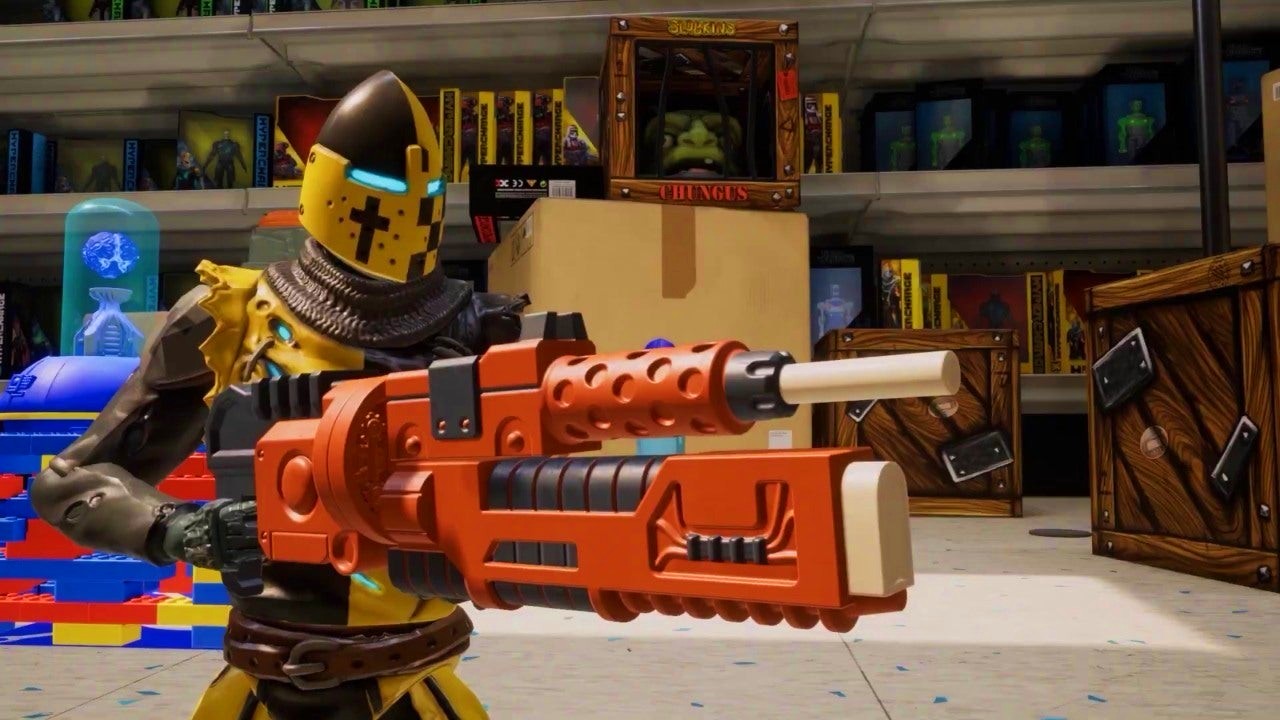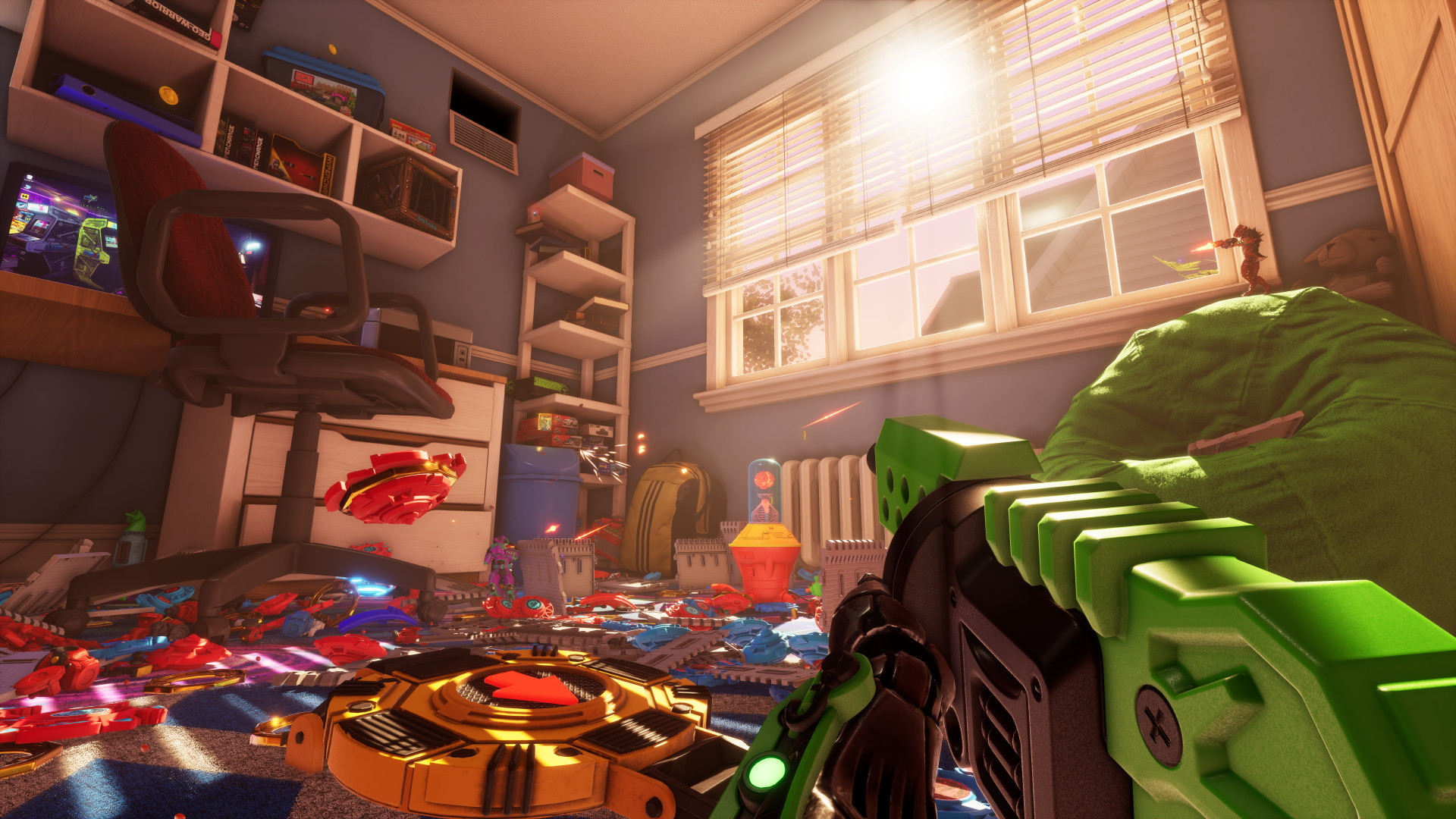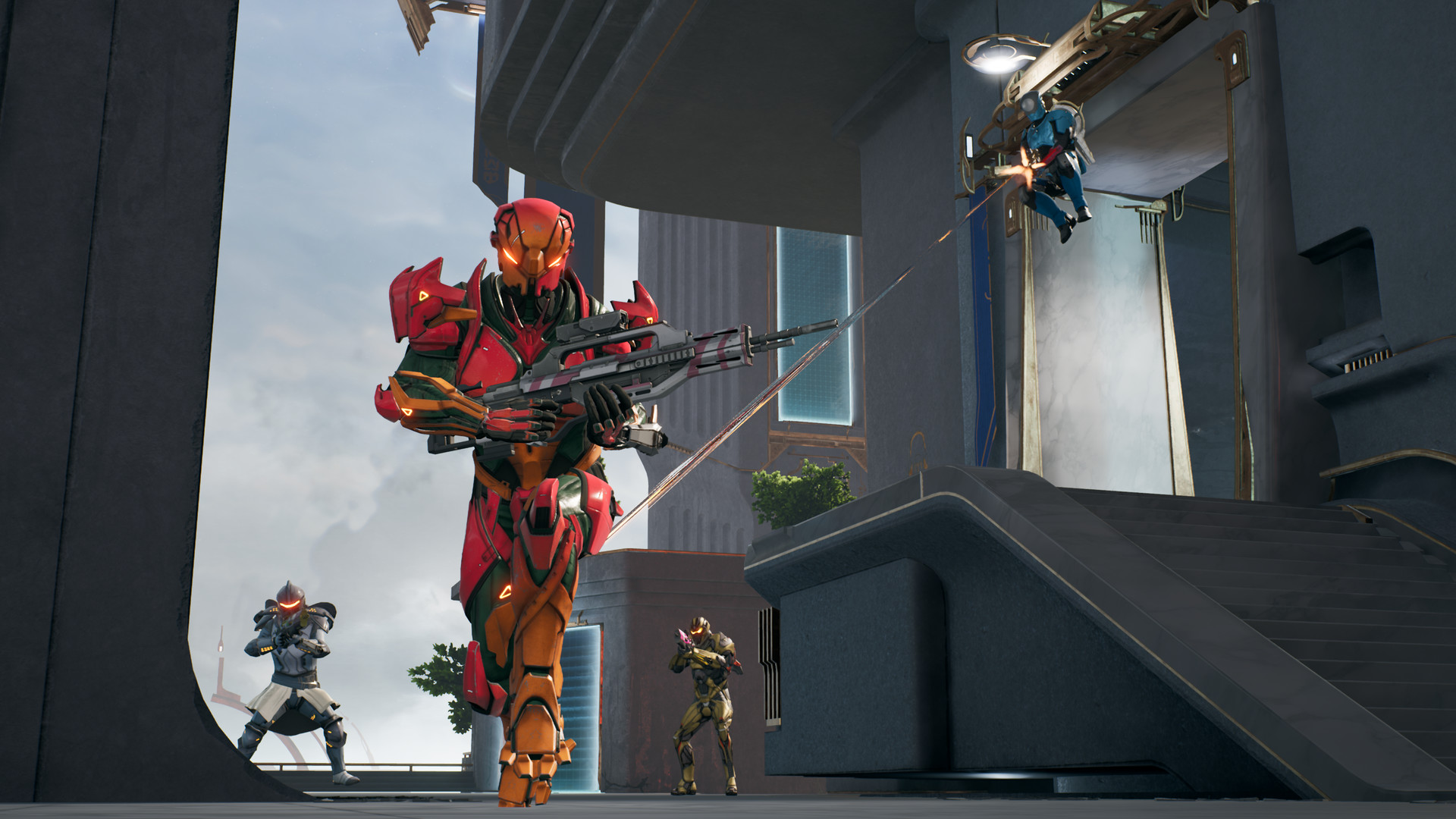The new videogame marketing tactic: Pretending an old game is brand new
Viral arena FPS Hypercharge is the latest game to get a do-over launch.

When a new multiplayer shooter launches on Steam, one of two things usually happens: It either captures the attention of a dedicated playerbase, or fizzles out into a wasteland of empty servers. As brutal as it can be, this is how PC gaming's fickle digital marketplace works. You get one chance to launch a game and make your first impression. Or do you?
There's another maneuver that a few developers have tried lately, and it's working pretty well so far: Pretend your old game is new and try not to mention that it previously failed.
This do-over phenomenon played out this week with Hypercharge: Unboxed, a multiplayer FPS about warring action figures that you might've seen a clip of on Twitter.
dear Xbox fans,positive vibes. let's make this tweet go viral!we are five adults who are making our childhood dream game where you play as "action figures"✅RT and RT some more!If you'd like to become an action figure on the Xbox, sign up here: https://t.co/siom0AIxZO pic.twitter.com/v3IuIjsf5IJuly 3, 2022
The official Twitter account for Hypercharge has spent the last few weeks sharing daily clips of the game, usually with a short pitch like "we are five adults who are making our childhood dream game" or "imagine a game based on our childhood action figures." They often ask for help making their tweets go viral or tag major influencers. Going just by the tweets, you'd be forgiven for not realizing that Hypercharge came out two years ago, and on two different platforms. Hypercharge released in 2020 on Steam and Switch, and it was available in early access for years before that. Despite generally positive reviews and appearing on Steam's top sellers list, it didn't hold an audience for long.
As far as Twitter is concerned, however, Hypercharge is a new viral hit. Those daily clips of knockoff Goku and GI Joe figures battling it out in charming toy store arenas paid off. One particularly popular tweet has amassed 14 million video views in just three days.
"These 5 dudes are trying to make an indie game," said esports influencer Jake Lucky in a popular tweet, implying that Hypercharge hasn't been made yet. The Verge's Tom Warren also briefly described Hypercharge as "an upcoming Xbox indie game" before later correcting that statement in a less-popular reply. IGN called attention to the game without saying that it was new, but at that point, the new game buzz had clearly done its job. Hypercharge has drawn a peak of 555 concurrent players in the last 30 days, but it appears to be on an upward trend.

Developer Digital Cybercherries' recently announced plans to put Hypercharge on Xbox and PlayStation someday, but that's the only new thing about it. It's the same game it was a few weeks ago when hardly anyone knew about it, except that now it's surrounded by new game buzz.
Keep up to date with the most important stories and the best deals, as picked by the PC Gamer team.
As far as Digital Cybercherries is concerned, Hypercharge's viral blowup was a happy accident.
"We have never disguised or misinformed players that Hypercharge hasn't been out and, in fact, encouraged them to check out the other platform versions," studio rep Joe Henson told PC Gamer. "We've been communicating to our community about porting the game on Xbox and PlayStation, to whom this will be a brand new game and so the communications for that audience are being tailored. But never hiding the game’s past, I might add."
The Hypercharge Twitter account did acknowledge the game's past struggles this week when linking to a 2020 feature by PCGamesN, though the tweet frames it in a 'now that we've made it' sort of way.
Henson says the recent commotion started after he posted a video from the Hypercharge account about abuse he'd been experiencing from Xbox fans interested in the Hypercharge console port. "I never imagined all this going viral, but I was in a bad place and wanted to start a conversation among other indie devs about the toxicity in the industry," Henson said.
Developer 1047 Games pulled off a similar old-game-new-game feat with Splitgate, the "Halo with portals" arena shooter that had a moment in the spotlight this time last year. Splitgate hit big when it entered its "open beta" on PC and consoles in 2021, racking up over 10 million players over a few months. Except, Splitgate was not a new game at that time, and it had already left its beta phase nearly two years earlier.
Splitgate came out in 2019 on Steam (back then it had a subtitle, "Arena Warfare"), and despite generally positive impressions from us, almost nobody played it.

As 1047 was preparing to launch on consoles in 2021, it put the game back into "open beta." Even the PC version, which had been fully out for two years, suddenly became a beta. I'm not a marketer, but I reckon the beta tag had more to do with manufacturing some of that new game buzz than fixing bugs that weren't caught in the original beta period. And thus, Splitgate, the cool-but-floundering arena shooter from two years ago became Splitgate, a new shooter in open beta.
Promoting a game within the internet's tangled web of shifting algorithms is tough, and making a good game doesn't guarantee success. But when an old game is presented like a new one, I can't help but feel like someone's tried to pull one over on me. It spoils some of the fun of discovering actual new games on Twitter. I remember the thrill I felt when Dennis Gustafsson tweeted the first gameplay of Teardown, a destruction sandbox game that'd eventually become a Steam hit and one of my favorite games in years. On the other other hand, asking for truth in marketing is about as useful as asking a mountain to move.
Hypercharge and Splitgate are hardly the only games to blur the line between old and new, or released and unreleased: Games "release" from early access all the time without really changing, or go into "open beta" with a full microtransaction store, or unlaunch and then relaunch. In a recent attempt to make sense of one weird modern game release, I arrived at the conclusion that Overwatch 2 isn't actually 'Overwatch 2'.
So, did the artificial new game buzz work?
Splitgate's player base isn't as big as it was a year ago, but things seem to be going well. There are still a few thousand people playing it on Steam daily, still more than enough players to support a niche arena shooter with cool ideas, and there are more players on consoles. It hasn't maintained its peak momentum of 67,000 players in August 2021. Our taste for arena shooters may be fleeting, but 1047 Games was able to turn its buzz into a $100 million funding round while it was at its peak, and the game continues to be relatively successful—Halo Infinite has more Steam concurrents, but not by that much.
As for Hypercharge, the jury is still out, but so far its popularity seems to start and stop at those 14 million video views. This week, its concurrent player count on Steam peaked at 555. That's several hundred more players in Hypercharge than a few months ago, but still far from its all-time peak of 900 players in April 2020, the month it actually launched. It's possible the console versions will change that, but no release date for them has been announced yet.
The originally published version of this article has been updated to reflect comments from Digital Cybercherries.

Morgan has been writing for PC Gamer since 2018, first as a freelancer and currently as a staff writer. He has also appeared on Polygon, Kotaku, Fanbyte, and PCGamesN. Before freelancing, he spent most of high school and all of college writing at small gaming sites that didn't pay him. He's very happy to have a real job now. Morgan is a beat writer following the latest and greatest shooters and the communities that play them. He also writes general news, reviews, features, the occasional guide, and bad jokes in Slack. Twist his arm, and he'll even write about a boring strategy game. Please don't, though.

